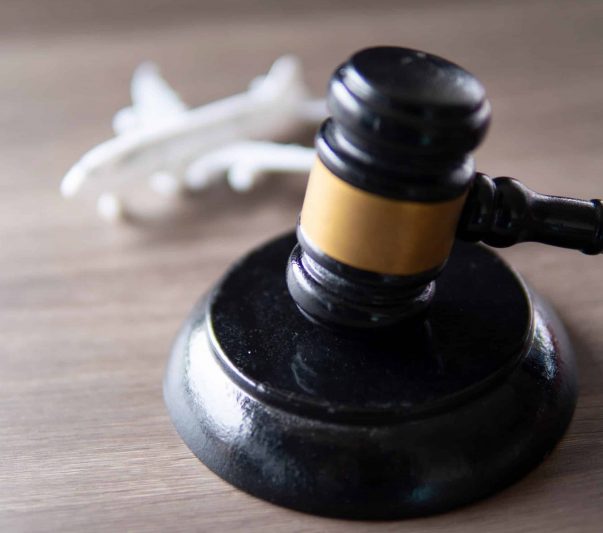In a personal injury claim, the word damages refers to your losses caused by another party’s negligence. When you file a lawsuit, you are seeking compensation for these damages.
Medical Bills
Many accidents or other personal injury situations result in injuries that need to be treated by a healthcare provider. Costs can include copays, deductibles, prescriptions, out-of-network care your health insurance doesn’t cover, or the entire bill if you don’t have health insurance. We also check with clients about related expenses they might have overlooked, such as mobility aids not covered by insurance, having work done to make your home accessible, travel costs to see a doctor who isn’t nearby, etc. Your lawyer will wait until they’re confident you’ve recovered to settle the case so that no future costs will be left out.
What about permanent injuries? We’ve seen cases where a client suffered severe injuries that left them in need of lifelong medical care. If this happens to you or a loved one, and your doctors provide documentation that continued care is necessary, we can estimate your future medical costs. After doing so, we will seek a settlement that encompasses your future care needs so you don’t have to worry about running out of money for your treatment.
If you receive damages for any costs already paid by Medicare, Medicaid, or private insurance, you will have to reimburse the insurer. Your lawyer can take care of this step for you.
Lost Income
If you’re hurt and can’t work, this can quickly cause you financial problems. For some people, even a week or two out of work can have serious consequences, and if you use your paid time off (PTO), you lose that saved time. Additionally, some people only have a few days or weeks of PTO and run out before they can return to work. Your lawyer will ask how long you were out of work and will probably request copies of your pay stubs so they can calculate how much money you lost.
Again, permanent injuries can prevent you from ever going back to work. Or, you might be able to work, but only on a reduced schedule or in a different field that doesn’t pay as well. If this happens, we will also seek damages for your lost earning potential.
Additional Costs
Sometimes your injuries may prevent you not only from going to work but from getting everyday chores done around the house. If you have to pay someone to do housework, yard work, or childcare that you normally do yourself, you deserve compensation for these expenses too.
Property Damage
If your car was damaged in an accident, you could seek the help of an auto collision attorney to determine payment for the repairs or, in some cases, replacement costs. In other situations, you may have damage to a boat, bicycle, ATV, or another type of vehicle. Additionally, some people need repairs or replacement of phones, laptops, or other electronics involved in an accident.
Pain and Suffering
Even if you’re in a lot of pain, you may not think of pain as a damage, because you don’t receive an invoice for it. But when you suffer pain, you do experience a loss – a loss of your time, your peace of mind, and your enjoyment of life.
Pain and suffering damages include both physical injuries and emotional or mental effects. Studies have shown that between 10 and 20 percent of people who survive road traffic accidents (RTAs) have ongoing mental health issues, including PTSD and depression. Chronic physical pain is also common after car accidents, especially in older adults. But regardless of how long your pain lasts, you have the right to be compensated for it.
In Colorado, pain and suffering damages are usually capped at $250,000 or $500,000, adjusted for inflation every few years. The current cap is $642,180 or $1,284,370, depending on whether or not you can show “clear and convincing evidence” beyond the typical burden of proof in a civil case. (Your attorney will let you know if this is likely based on the evidence in your case.)
Wyoming does not allow any caps on personal injury damages, except in a few uncommon situations that involve lawsuits against the government.
Physical Impairments
If you sustained a permanent injury resulting in a disability or disfigurement, this is a separate damage. There is also no cap on pain and suffering related to permanent physical impairment. Your lawyer will talk with you about the effects your injury has had on your life in order to determine a reasonable amount to seek.
Damages in a Wrongful Death Case
If you’ve lost a loved one, it can seem impossible to put a dollar amount on the value of their life. But unfortunately, this is the only kind of compensation you can pursue in a civil case. For many people, the damages they seek represent a way to carry out the deceased person’s wishes – to ensure their children are cared for, to support causes they loved, and to provide an opportunity for family members to grieve their loss without wondering how they’ll keep the lights on.
There are also very real economic losses when a person dies, such as:
- Burial or funeral expenses
- Medical bills before the death
- Loss of financial support if the deceased was a primary earner for the family
You can also seek non-economic damages, such as your own pain and suffering, in a wrongful death case. The same caps on pain and suffering apply, except in cases of felonious killing, where there is no cap.
Punitive Damages
These exist in their own category outside of economic and non-economic damages. As the name suggests, punitive damages aren’t about compensating a person for their loss but punishing the responsible party. Most personal injury cases involving simple negligence will not qualify for punitive damages. However, these might be available if your case involves:
- Fraud
- Malice
- Willful or wanton misbehavior
The third option is the most common reason punitive damages are awarded. In these cases, it’s necessary to show that the defendant made a dangerous or reckless choice, even though it should have been evident that this would result in a dangerous situation. For example, it should be obvious that driving 90 MPH in a school zone is a dangerous activity and could cause severe injury or even death to a pedestrian.
Under Colorado law, punitive damages should not exceed the amount of other damages awarded.
How Do I Get My Damages Paid?
We often begin by filing a claim with the relevant insurer, but we don’t recommend doing this step yourself for several reasons:
- Determining your damages is a complex process, and the average person will not estimate their claim’s value accurately. It’s easy to forget about expenses, underestimate future costs, etc. Unfortunately, some people settle a claim with the insurance company, only to realize they still have additional expenses that weren’t included. But once the claim is settled, they have no recourse to get these covered.
- The insurance company may reject your claim for various reasons, the most popular of which is claiming you were actually at fault. In Colorado and Wyoming, the insurance company doesn’t have to provide evidence that their client was innocent, only that you also had some fault in the accident. The reality is that many accidents are the fault of more than one party, but an insurance adjuster is likely to take advantage of this fact and argue that you were mostly at fault (more than 50 percent), which would mean that you couldn’t collect damages under Colorado or Wyoming law.
- The insurance adjuster could also undervalue your claim. Even if they can’t succeed with the argument that you were primarily to blame, they might inflate the amount of fault you actually had, resulting in a smaller settlement for you. This is because whatever percentage of fault you’re assigned is subtracted from your settlement amount.
- Sometimes the insurance adjuster uses a different tactic, especially if they really can’t find any evidence that you were even slightly responsible for the accident. Instead of arguing that you were to blame or rejecting your claim out of hand, they might just make you an offer. In fact, you could get an offer very quickly after filing a claim. You’re probably thinking that sounds good, but unfortunately, an insurance company’s first offer is frequently a lowball one that doesn’t cover all the injured party’s damages. (This is even more likely if the offer arrives swiftly.) We strongly recommend having any insurance offer reviewed by an attorney before you accept.
How Can I Get Help with My Personal Injury Claim?
Contact the Olson Personal Injury Lawyers for a free, confidential consultation about your case. We’ll review the details of your accident or injury, answer your questions, and outline the options for seeking compensation. Attorney Sean Olson personally meets with every client to learn their story and help them find solutions for their situation.







